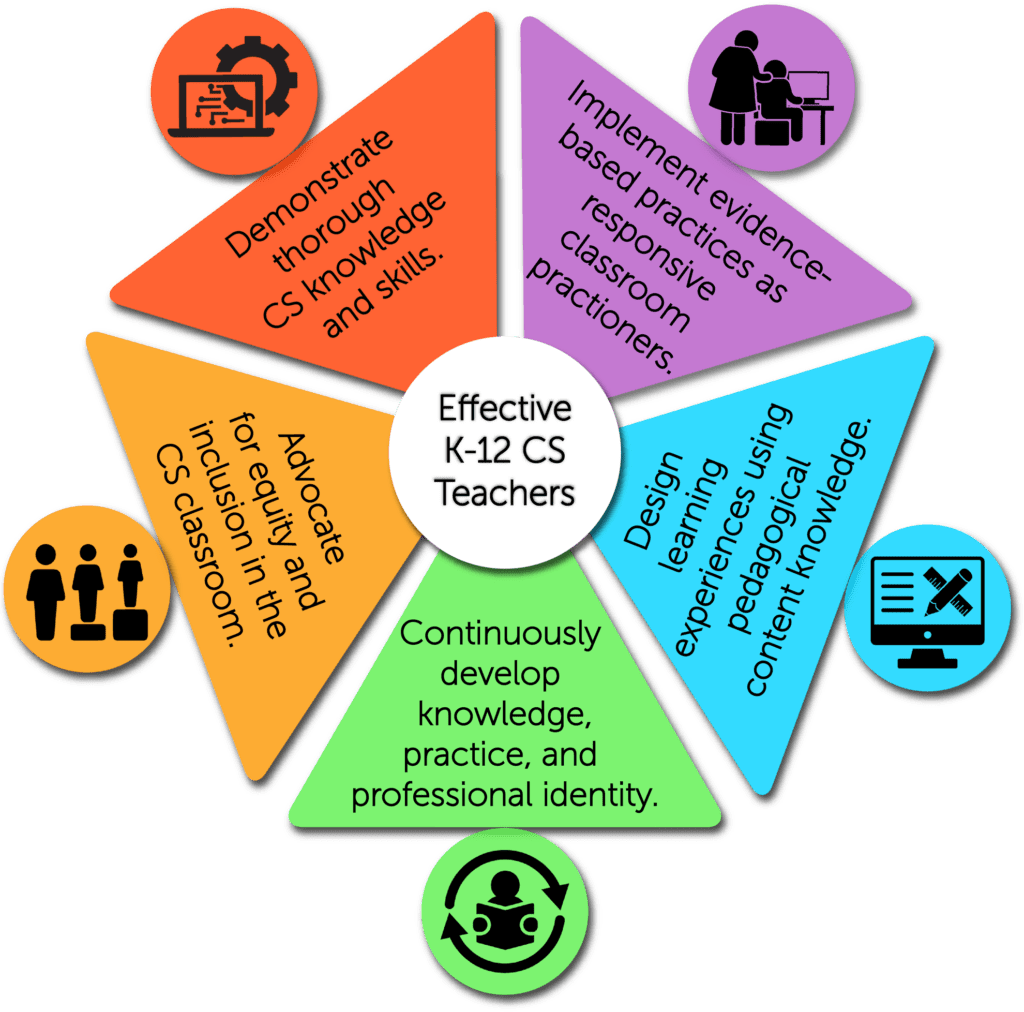The field of computer science education has rapidly accelerated over the past two decades, thanks to the contributions of countless organizations. Over the years, we have learned a great deal about effective K–12 CS instruction. By publishing this new version of Standards for CS Teachers, we aim to complement the universal outcomes for student learning delineated in the K–12 CS Framework (2016) and CSTA K–12 CS Standards (2017). The Standards for CS Teachers establish robust standards to help teachers prepare their students to meet these CS learning outcomes.
In 2019, CSTA launched an effort to revise the Standards for CS Educators in partnership with the International Society for Technology in Education (ISTE). These Standards were created and first published in 2003, updated in 2011, and rewritten in 2019 for a 2020 release. Since the latest release, teams of volunteers have created new resources to support implementation.
Vision
Effective CS teachers must have thorough CS skills and content knowledge and must understand the student learning progression. They must continuously refine their skills and pedagogical content knowledge to support all students in meeting learning outcomes.
These Standards are aspirational, and they depend on sustained professional development and learning. We intend to provide a level of specificity that offers sufficient guidance to novice CS teachers while allowing experienced CS teachers room for professional growth. This is critical because CS teachers enter the field from many different areas of specialization, and their preparation varies significantly. Each indicator is not an expectation of current knowledge, but a roadmap to help teachers from different entry points identify their strengths and areas of need. We hope teachers use this information to seek out targeted professional development opportunities to increase their mastery.

Purpose
These Standards are designed to provide clear guidance around effective and equitable CS instruction in support of rigorous CS education for all K–12 students. The purpose is to:
- explain what CS teachers should know and be able to do in the classroom
- provide aspirational goals to guide teachers’ professional learning as they continuously develop their teaching practice from novice to master CS teacher
- establish benchmarks for professional development providers as they craft CS PD experiences
Audience
These Standards are designed for novice and experienced teachers who primarily teach computer science. While we anticipate that many in the CS education community will find value in these Standards, we designed them for a few specific audiences:
- Schools of education will use these Standards to develop new, or refine existing, preservice programs.
- PD providers will use these Standards to develop new, or refine existing, in-service professional learning programs.
- State leaders will use these Standards to develop policies, including pathways for teacher certification.
- K–12 administrators will use these Standards to support their CS teachers in setting and meeting professional learning goals.
- K–12 CS teachers will use these Standards to reflect on their strengths and areas of growth, set professional growth goals, and identify targeted PD opportunities to meet these goals.

Future Work
The writing team envisions these standards as the foundation for additional work. We expect and hope that other groups will use these standards to create new learning progressions scaffolded for the diverse and flexible pathways through which teachers begin teaching CS and develop mastery of their craft. For example, others may develop benchmarks for preservice teachers or define competencies to facilitate CS teachers in demonstrating their mastery of these Standards. We are excited to partner with others to advance a shared vision for high-quality teaching of K–12 computer science.
License & Attribution
These Standards are licensed under the Creative Commons Attribution-NonCommercial-ShareAlike 4.0 International License (CC BY-NC-SA 4.0). Accordingly, individuals and organizations are free to share and adapt the materials in whole or in part, as long as they provide proper attribution, do not use for commercial purposes, and share contributions or derivations under the same license.
Suggested citation: Computer Science Teachers Association (2020). Standards for Computer Science Teachers. Retrieved from https://csteachers.org/teacherstandards.
